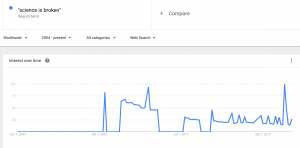
August 30, 2016, by Brigitte Nerlich
Broken science, broken record?
The phrase ‘science is broken’ recently popped back into my head. I had read it quite often in the past, but in the context of current debates about the place of science in society I began to ask myself: What does this phrase actually mean? And why do people use it?
‘Science is broken’
To get a first grip on the issue I put ‘science is broken’ into Google and got 220,000 results. I then looked at Google trends and found that the phrase first appeared in around 2008 and has been with us ever since. There was a peak in January 2008 (for which I couldn’t find a reason), one around 2010 (I can’t help thinking that climategate had something to do with this), and another one in April 2016.
The more recent search activity was probably provoked by an article entitled “Scientific regress” written by William A.Wilson. This article was then picked up and discussed by Pascal Emmanuel Gobry in a blog post entitled “Big science is broken”, by Benny Peiser in a post entitled “Big science is broken” and by others critical of mainstream climate science.
The original article speaks of science as a cult, a popular metaphor used for criticising science, in particular climate science: “If science was unprepared for the influx of careerists, it was even less prepared for the blossoming of the Cult of Science. The Cult is related to the phenomenon described as ‘scientism’; both have a tendency to treat the body of scientific knowledge as a holy book or an a-religious revelation that offers simple and decisive resolutions to deep questions.” The last sentence of the article reads: “The greatest friends of the Cult of Science are the worst enemies of science’s actual practice.”
A year earlier, in March 2015, there had also been some chatter about whether science was broken or not. This was provoked by a conference organised at UCL, an event in which actual practising scientists participated. Here you can read about the lively debate in which they engaged. I’ll come back to some of things that were said at the UCL conference later.
There are, I think, two types of discourse attached to the ‘science is broken’ phrase, one more pessimistic and the other more optimistic, one more deconstructive and the other more constructive.
What does ‘broken’ mean?
But what does it actually mean to pose the question: Is science broken? Or to say that science is broken? First of all, what does ‘broken’ mean? According to the Oxford English Dictionary, the adjective ‘broken’ means “Separated forcibly into parts; in fragments; in pieces. (The resulting damaged state is often the main notion)”.
So talking about science being broken evokes this fragmenting into pieces, something that is obviously bad and leads to ‘a damaged state’. Prototypical examples of things being broken are, in order of their first use as listed by the OED: a ‘brocenan beorge’, which I think is a hill or barrow (737), a ‘staf’ (1383), a ‘sper’ (1500), a ‘vessel’ (1535), ‘oars’ (1719), ‘walls and roofless, unglazed churches’ (1868).
These ‘broken’ things are all concrete objects, apart from the mysterious ‘hill’. Most are quite precious possessions that cannot be used after being broken and need to be replaced or repaired. What about science? It seems to be a precious thing, even to those who argue that it is completely broken. Can it be replaced or repaired? Can it be fixed? What needs fixing? Who is fixing things?
Answers to these questions depend of course on what we mean by ‘science’. Do we mean science as a tried and tested method? Do we mean science as a social institution? Do we mean science as an academic institution? Do we mean the scientific process? Do we mean scientific practice? Do we mean the natural sciences? Do we mean the social sciences? And so one could go on.
What is broken?
So we know now that the phrase ‘science is broken’ has some currency and we also know what ‘broken’ means in everyday language. I now wanted to know whether particular sciences, rather than science in general, attracted a similar description, namely that of being broken. So I searched for ‘physics is broken’ on Google, but got no real results; ‘biology is broken’, the same. I even tried ‘sociology is broken’ and ‘economics is broken’ in order to widen my scope to the social sciences, and again no results – but I learned a lot about the ‘broken window fallacy’ in the process. So what does it mean for ‘science’ to be broken’ when particular sciences are actually not ‘broken’ (it seems).
However, I found that there are exceptions. ‘Medicine’ seems to be rather broken according to some (‘medicine is broken’ gave me 120,000 results – many linking back to discussions started by Ben Goldacre on evidence-based medicine, big pharma and so on). This discourse would deserve some special attention.
Finally, I also tried ‘climate science is broken’, which gave me 23,800 results. I also found a blog post with the title “Climate science was broken” which summarises an essay by Richard Lindzen. The post lists a few reasons for arguing why ‘science’, in particular ‘climate science’, may be deemed to be broken, namely, a shift from science being “a successful mode of enquiry into a source of authority” (this seems to imply that the authority is only assumed not earned); “incentives [that] are skewed in favor of perpetuating problems than solving them” (this seems to imply that scientists are actively involved in trying not to find solutions to things), and most of all the politicisation of climate science. These are talking points that seem to come up again and again in discussions about science being broken. They focus on credibility, authority, politics, corruption, issue that have been particularly in vogue since the end of 2009 and climategate.
When one digs a little bit deeper into this particular science is broken talk, one finds headlines that refer to science being self-serving, a scam, driven by political agendas, and an enterprise that can’t be trusted. As one blogger said: “Taken together, headlines … might suggest that science is a shady enterprise that spits out a bunch of dressed-up nonsense.”
This type of discourse, alongside headlines about actual scientific fraud, hype and misconduct, leads to loss of public trust in science. Trust is broken or ‘in a damaged state’. How can both science and trust be restored? I think this can only happen when we look beyond the stereotypical ‘science is broken’ discourse. This means, either doing science and changing it from within or entering the treacherous arena of politics, where scientists encounter big ‘keep out’ signs. My question is: What is the contribution of the prevailing ‘science is broken’ discourse to making things ‘better’ – in fixing or mending things?
Mending things
Since the beginning of time scientists have been ‘fixing’ science. Science is built on mistakes and blind alleys; indeed braking things, including staffs, spears and vessels, is part of the job. And scientists are quite good at spotting cracks and faults and bringing them out into the open. However, that is probably not what the general ‘broken science’ discourse refers to.
Lots of (physical, biological, biomedical, psychological) scientists are currently involved in trying to mend some more general aspects of modern scientific practice and are actively discussing problems around replication, reproducibility, p-values, publication of negative results, open data, open access and much much more. But, again, it seems to me that this is only partially what the ‘broken science’ discourse refers to.
There is however a middle ground between those busily fixing flaws in science and those arguing science is practically beyond fixing and a scam. There are aspects of science as a social and political institution that may indeed be damaging the process and practice of science, such as pressures to publish, bad incentives, failures in peer review, the marketisation of universities, professional misconduct, image manipulation, ethics infringements, fake data and so on. Here again, many scientists are busily trying to change things, but political and economic constraints and pressures pose quite formidable barriers to progress.
These big and small attempts at mending things are linked to discourses where people argue that ‘science’ isn’t actually broken, but is much harder than people think it is, or that science needs lots of tender loving care, and so on. One participant in the lively 2015 debate about broken science at UCL made the following point: “First of all, probably nobody seriously believes that the lofty concept of science, the scientific method (if there is one such thing), can even be broken. But even in more pragmatic terms, the human aspects of how science works are not broken either. My main point was that the very fact we are having these kinds of discussions, about how scientific research can be improved, is direct proof that science is in fact very healthy. This is what self-correction looks like.”
He or she then goes on to spell out what can be done about publishing and peer review, post-publication review, research funding and hiring decisions. Further recommendations about how to change things for the better, how to mend what needs mending, can be found in another blog post by Steven Novella on the Neurologica blog, this time focusing on quality of research, bias, replication, mistakes and fraud.
Keeping an eye on things
It is good to be vigilant when it comes to science, so that we can step in when things go wrong. However, in order to do so, we need not only to say that science is broken, we need to do science (better) and/or we need to create better conditions for doing good science. As NeuroNeurotic says: “So instead of fretting over whether science is ‘broken’ (No, it isn’t) or even whether it needs improvement (Yes, it does), what we should be talking about is specifically what really urgently needs improvement.”
Image: Pixabay


Academia has no procedure to correct junk published in academic journals. I noticed that recently when I came across a junk article that looks like it can never be retracted because no one will complain about it.
I’ve just come across this: A scientist explains: Everything is fucked
https://www.inverse.com/article/21272-science-academia-sanjay-srivastava-fucked
Seems a little harsh to me.
Lovely, if that’s the right word. I agree with lots of what he says!
It does not help that junk science like this is being published. General members of the public have almost zero chance (or time) to figure out that it is junk, and meanwhile it is being used as “evidence” in antivacc articles.
http://www.mednat.org/vaccini/danni_neurologici_vaccini.pdf
I’ve certainly struggling to find the evidence that this is, or is not, a reputable journal.
I good person to follow in this respect is Timothy Caulfield! http://www.hli.ualberta.ca/People/TimothyCaulfield.aspx
Thank you for this, and all your other, kindly provided references and responses.